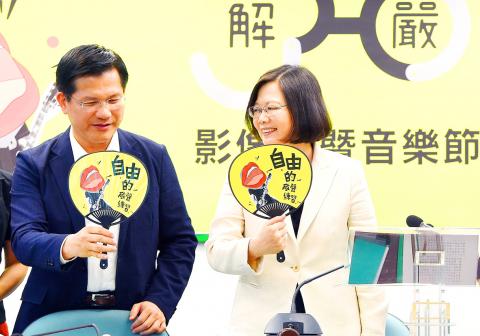The Democratic Progressive Party (DPP) is to mark the 30th anniversary of the lifting of martial law with a series of events from Saturday.
“In today’s Taiwan, people can take to the streets for social issues, but that was forbidden in the Martial Law era. In today’s Taiwan, people can pen articles criticizing the government, but it was forbidden in the Martial Law era,” President Tsai Ing-wen (蔡英文) said at a meeting of the party’s Central Standing Committee in Taipei.
“Today, we encourage the use of native tongues and legislate for the promotion of ethnic languages, but in the Martial Law era, the so-called dialects were ignored and suppressed,” Tsai said.

Photo: Liao Chen-huei, Taipei Times
Songs that are popular today might have been banned in the past for unlikely reasons, such as late Hoklo singer Kuo Chin-fa’s (郭金發) song about post-war poverty in 1949, which was banned because of its grim lyrics, she said.
“These stories remind us that the freedom and democracy Taiwan enjoys today is not a matter of course. Freedom is not a given and democracy is not a gift from rulers. Everything we have today was won by the struggles of Taiwanese,” the president said.
To commemorate the anniversary is to review the mistakes made in the nation, and safeguard hard-earned freedom and democracy, she said.
The DPP is to hold a music festival, an exhibition and a fair at the Taichung Cultural and Creative Industries Park from Saturday to Monday to mark the 30th anniversary of the lifting of martial law on July 15, 1987.
The music festival is to feature independent artists and bands performing songs banned or repressed during the Martial Law era.
The exhibition is to display items banned during the period, such as books, recordings and magazines, as well as visual and audio archives documenting democracy movements and campaigners.
Veteran singer and senior DPP official Yu Tian (余天) said that in the 1970s, the government banned several of his songs and he was banned from the stage for a year for making a sexually explicit joke on stage.
One of his songs was banned because of the lyrics: “I was hurt walking on a thorny road,” that was misinterpreted as a political metaphor, but actually referred to life’s struggles, Yu said.
The now-defunct Government Information Office censored television and radio programs and screened live performances, and the office-controlled Confederation of Entertainment Unions banned him from the stage for one year, he said.
“Songs were banned for various reasons. We did not have a clear understanding of the censorship standards. Whatever was determined inappropriate or unconventional would be banned,” he said.
Tsai also reiterated calls for Beijing to allow Chinese Nobel laureate Liu Xiaobo (劉曉波) to receive medical treatment overseas in the country of his choice.
“The news of his [Liu Xiaobo’s] cancer and faltering health has not only concerned us, but the whole world,” the president said.

TRAGEDY STRIKES TAIPEI: The suspect died after falling off a building after he threw smoke grenades into Taipei Main Station and went on a killing spree in Zhongshan A 27-year-old suspect allegedly threw smoke grenades in Taipei Main Station and then proceeded to Zhongshan MRT Station in a random killing spree that resulted in the death of the suspect and two other civilians, and seven injured, including one in critical condition, as of press time last night. The suspect, identified as a man surnamed Chang Wen (張文), allegedly began the attack at Taipei Main Station, the Taipei Fire Department said, adding that it received a report at 5:24pm that smoke grenades had been thrown in the station. One man in his 50s was rushed to hospital after a cardiac arrest

SAFETY FIRST: Double the number of police were deployed at the Taipei Marathon, while other cities released plans to bolster public event safety Authorities across Taiwan have stepped up security measures ahead of Christmas and New Year events, following a knife and smoke bomb attack in Taipei on Friday that left four people dead and 11 injured. In a bid to prevent potential copycat incidents, police deployments have been expanded for large gatherings, transport hubs, and other crowded public spaces, according to official statements from police and city authorities. Taipei Mayor Chiang Wan-an (蔣萬安) said the city has “comprehensively raised security readiness” in crowded areas, increased police deployments with armed officers, and intensified patrols during weekends and nighttime hours. For large-scale events, security checkpoints and explosives

A car bomb killed a senior Russian general in southern Moscow yesterday morning, the latest high-profile army figure to be blown up in a blast that came just hours after Russian and Ukrainian delegates held separate talks in Miami on a plan to end the war. Kyiv has not commented on the incident, but Russian investigators said they were probing whether the blast was “linked” to “Ukrainian special forces.” The attack was similar to other assassinations of generals and pro-war figures that have either been claimed, or are widely believed to have been orchestrated, by Ukraine. Russian Lieutenant General Fanil Sarvarov, 56, head

PUBLIC SAFETY: The premier said that security would be tightened in transport hubs, while President Lai commended the public for their bravery The government is to deploy more police, including rapid response units, in crowded public areas to ensure a swift response to any threats, President William Lai (賴清德) said yesterday after a knife attack killed three people and injured 11 in Taipei the previous day. Lai made the remarks following a briefing by the National Police Agency on the progress of the investigation, saying that the attack underscored the importance of cooperation in public security between the central and local governments. The attack unfolded in the early evening on Friday around Taipei Main Station’s M7 exit and later near the Taipei MRT’s Zhongshan